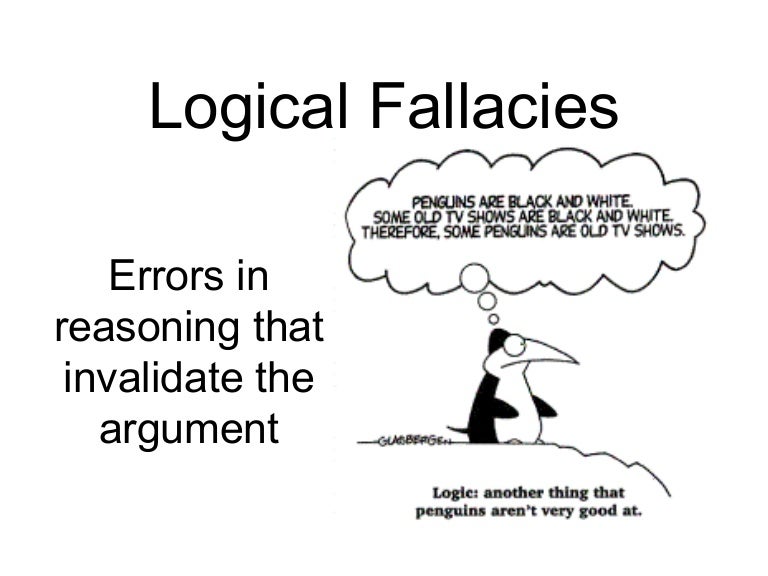
Fallacies are common errors in reasoning that will undermine the logic of your argument. Fallacies can be either illegitimate arguments or irrelevant points, and are often identified because they lack evidence that supports their claim. Avoid these common fallacies in your own arguments and watch for them in the arguments of others.
Slippery Slope: This is a conclusion based on the premise that if A happens, then eventually through a series of small steps, through B, C,..., X, Y, Z will happen, too, basically equating A and Z. So, if we don't want Z to occur, A must not be allowed to occur either. Example:
If we ban Hummers because they are bad for the environment eventually the government will ban all cars, so we should not ban Hummers.
In this example, the author is equating banning Hummers with banning all cars, which is not the same thing.
Hasty Generalization: This is a conclusion based on insufficient or biased evidence. In other words, you are rushing to a conclusion before you have all the relevant facts. Example:
Even though it's only the first day, I can tell this is going to be a boring course.
In this example, the author is basing his evaluation of the entire course on only the first day, which is notoriously boring and full of housekeeping tasks for most courses. To make a fair and reasonable evaluation the author must attend not one but several classes, and possibly even examine the textbook, talk to the professor, or talk to others who have previously finished the course in order to have sufficient evidence to base a conclusion on.
Post hoc ergo propter hoc: This is a conclusion that assumes that if 'A' occurred after 'B' then 'B' must have caused 'A.' Example:
I drank bottled water and now I am sick, so the water must have made me sick.
In this example, the author assumes that if one event chronologically follows another the first event must have caused the second. But the illness could have been caused by the burrito the night before, a flu bug that had been working on the body for days, or a chemical spill across campus. There is no reason, without more evidence, to assume the water caused the person to be sick.
Genetic Fallacy: This conclusion is based on an argument that the origins of a person, idea, institute, or theory determine its character, nature, or worth. Example:
The Volkswagen Beetle is an evil car because it was originally designed by Hitler's army.
In this example the author is equating the character of a car with the character of the people who built the car. However, the two are not inherently related.
Begging the Claim: The conclusion that the writer should prove is validated within the claim. Example:
Filthy and polluting coal should be banned.
Arguing that coal pollutes the earth and thus should be banned would be logical. But the very conclusion that should be proved, that coal causes enough pollution to warrant banning its use, is already assumed in the claim by referring to it as "filthy and polluting."
Circular Argument: This restates the argument rather than actually proving it. Example:
George Bush is a good communicator because he speaks effectively.
In this example, the conclusion that Bush is a "good communicator" and the evidence used to prove it "he speaks effectively" are basically the same idea. Specific evidence such as using everyday language, breaking down complex problems, or illustrating his points with humorous stories would be needed to prove either half of the sentence.
Either/or: This is a conclusion that oversimplifies the argument by reducing it to only two sides or choices. Example:
We can either stop using cars or destroy the earth.
In this example, the two choices are presented as the only options, yet the author ignores a range of choices in between such as developing cleaner technology, car-sharing systems for necessities and emergencies, or better community planning to discourage daily driving.
Ad hominem: This is an attack on the character of a person rather than his or her opinions or arguments. Example:
Green Peace's strategies aren't effective because they are all dirty, lazy hippies.
In this example, the author doesn't even name particular strategies Green Peace has suggested, much less evaluate those strategies on their merits. Instead, the author attacks the characters of the individuals in the group.
Ad populum/Bandwagon Appeal: This is an appeal that presents what most people, or a group of people think, in order to persuade one to think the same way. Getting on the bandwagon is one such instance of an ad populum appeal.
Example:
If you were a true American you would support the rights of people to choose whatever vehicle they want.
In this example, the author equates being a "true American," a concept that people want to be associated with, particularly in a time of war, with allowing people to buy any vehicle they want even though there is no inherent connection between the two.
Red Herring: This is a diversionary tactic that avoids the key issues, often by avoiding opposing arguments rather than addressing them. Example:
The level of mercury in seafood may be unsafe, but what will fishers do to support their families?
In this example, the author switches the discussion away from the safety of the food and talks instead about an economic issue, the livelihood of those catching fish. While one issue may effect the other it does not mean we should ignore possible safety issues because of possible economic consequences to a few individuals.
Straw Man: This move oversimplifies an opponent's viewpoint and then attacks that hollow argument.
People who don't support the proposed state minimum wage increase hate the poor.
In this example, the author attributes the worst possible motive to an opponent's position. In reality, however, the opposition probably has more complex and sympathetic arguments to support their point. By not addressing those arguments, the author is not treating the opposition with respect or refuting their position.
Moral Equivalence: This fallacy compares minor misdeeds with major atrocities, suggesting that both are equally immoral.
That parking attendant who gave me a ticket is as bad as Hitler.
In this example, the author is comparing the relatively harmless actions of a person doing their job with the horrific actions of Hitler. This comparison is unfair and inaccurate.
